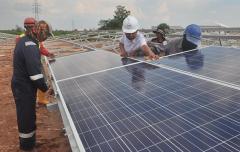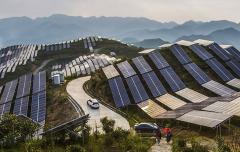Building markets for sustainable cooling technology in Indonesia
Energy efficiency is considered the ‘first fuel’ because it is the cheapest and cleanest option available to countries looking to transition away from their dependency on fossil fuels and to achieve the goals of the Paris Agreement on climate change.
Improving the efficiency for heating and cooling buildings is one of the most effective ways to reduce overall energy consumption. It is also good for business. In Indonesia, property developers and businesses such as convenience stores are proving how valuable energy efficiency can be on their bottom-lines.
Businesses Get On-Board
Rising temperatures, mounting energy costs, looming government revisions to core regulations around energy conservation for all sectors, and the presence of new financial incentives have prompted the likes of Alfamidi and Pakuwon Group to revamp their refrigeration and air conditioning systems.
Alfamidi, one of Indonesia’s largest convenience store chains, replaced or installed new energy-saving cooling equipment in 12 stores in the Greater Jakarta Area. This included replacing coolers and freezers with highly efficient units that reduced consumption by 23 percent compared to conventional technologies, as well as retrofits of air conditioners resulting in 50 percent of energy consumption reductions.
Agus Wibowo from Alfamidi says these new installations have not only helped the company save on operating costs, they have also boosted sales at the retail stores because of improved customer comfort.
Government Support
Wibowo says the decision to adopt the new efficient cooling technology was aided by the availability of a Joint Crediting Mechanism(JCM). The JCM is a bilateral partnership between the governments of Indonesia and Japan that creates a grant for Indonesian companies to purchase high-efficiency technologies from Japanese companies, with resulting CO2reduction credits being shared between the two countries.
Pakuwon Group, a property developer, also took advantage of the JCM scheme as part of a decision to replace five chillers with new high efficiency chillers at their Tunjungan Plaza shopping center in 2017.
Eko Supriyanto from Pakuwon Group explains that the company needed to reduce the overall costs of cooling while ensuring the comfort and safety of their customers. Leveraging the subsidy offered through the JCM to install new cooling technology, Pakuwon Group has reduced the electricity consumption at Tunjungan Plaza by approximately 3.9 million KWH/year.
Dicky Edwin Hindarto, advisor for the Indonesia JCM, explains that the goal of the JCM is to create demonstration projects showcasing the value of private sector investment in energy efficiency. In particular, the government is looking to prove that the payback period on efficiency technology is quite short regardless of the presence of subsidies.
Therefore, the JCM is seen as a catalyst for developing new markets for energy efficiency. This is especially valuable given what John Respati, Chairman of the Indonesian Energy Conservation and Efficiency Society, describes as a lack of private investment in energy efficiency projects from domestic financial services in Indonesia. The JCM fills this current void to provide a spark for self-sustaining markets in the long-term.
Indonesia's Cooling Needs
Local markets for high-efficiency cooling technology, both residential and commercial, are urgently needed in Indonesia.
According to the Chilling Prospects: Providing Sustainable Cooling for All report, Indonesia is among the top nine countries worldwide at risk of a lack of access to sustainable cooling. Chilling Prospectsalso shows Indonesia as having the second largest “Carbon Captive” population, used to describe a growing lower-middle class with limited purchasing power who are likely to turn to inefficient cooling devices that can cause a dramatic increase in energy consumption. This increase could undermine the country’s ability to shift away from its reliance on fossil fuels.
In addition to positive examples like Alfamidi and Pakuwon Group, Respati points to new government regulations on energy conservation (expected to be issued in September 2019) as a sign of progress. He explains that these regulations will cover all main sectors of the economy (Industry, Buildings, Transportation and Household), and they will encompass incentives and disincentives, clearer standards, target setting guidelines, and reporting requirements.
Importance of Capacity Building
However, Respati concedes there is still a lot of capacity building needed within government and the private sector for recognizing the full value of energy efficiency. This would help Indonesia create a wider set of efficiency standards to be imposed on both commercial and household cooling technologies, giving further momentum to the self-sustaining markets the JCM promotes.
Capacity building is one of the focus areas for Jejaring Indonesia Rendah Emisi (JIRE), a newly established multi-stakeholder network developed to support the achievement of national and global targets on emission reductions.
This network aims to create a knowledge hub that would facilitate the convergence between the Indonesian government’s sustainable development plans with the implementation capacities of the local private sector, CSOs, academics, investors and practitioners.
JIRE is part of the Shifting Financial Flows to Invest in Low-Carbon Development in Southeast Asia (SHIFT SEA) project. The project aims to accelerate the shift to clean energy in the high-impact countries of Vietnam, Philippines and Indonesia, with a focus on energy efficiency as one of the most cost-effective enablers to secure sustainable growth.
SHIFT SEA is a consortium of Sustainable Energy for All, Climate Action Network, Third Generation Environmentalism and Mission 2020 with local partners ICSC in the Philippines, GreenID in Vietnam and Yayasan Mitra Hijau in Indonesia and it is funded by the German International Climate Initiative.




